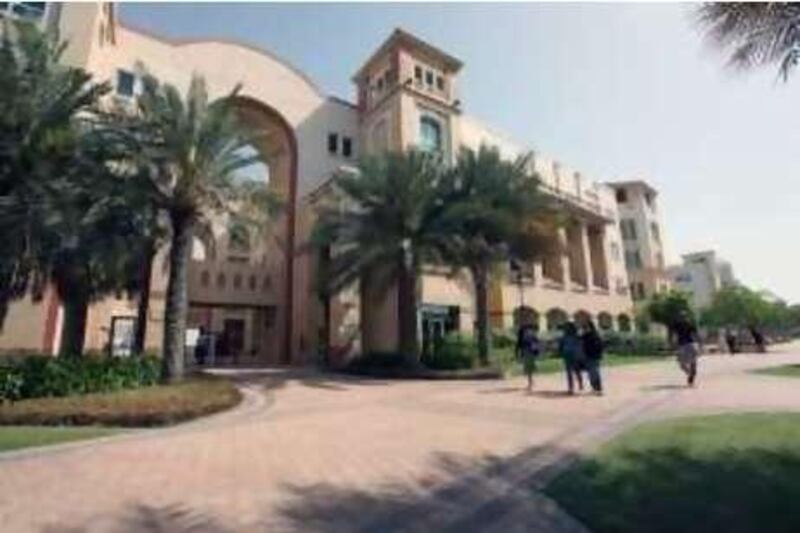DUBAI // The international branch campus universities in Dubai's free zones need to be regulated or the emirate's international reputation could be damaged, experts warn. Fifty international branch campuses (IBCs) operate in free zones such as Dubai International Academic City and Knowledge Village. Private universities in the five free zones are not subject to federal controls.
In a policy brief for the Dubai School of Government, the US academic Jason Lane, from State University of New York, wrote: "International branch campuses have a significant presence in Dubai's higher education sector, yet the role of these institutions is not yet fully understood." He said "the rapid expansion of the private higher education system in the UAE has been accompanied by a delay in government regulation".
"The lack of regulatory clarity creates confusion among students and institutions about local degree recognition," Mr Lane said. "Each free zone has established specific requirements about branch campuses having to provide academic programmes comparable in quality to the main campus. "However, the enforcement of these requirements has been unequal and sporadic. Moreover, since each of the four [main] free zones is administered by different authorities, there has been a lack of coordination in regard to this enforcement and each free zone has developed its own regulatory structure."
Anna Vignoles, from the Institute of Education at the University of London, said: "Some regulation is essential and the complexities of the current regulatory system probably do not help on this issue." She said that without this regulation, the emirate risks damaging its international reputation and could, in turn, taint the standing of local universities, even if they do offer higher quality education.
Fatma Abdullah, a fellow at the Dubai School of Government, said that until there is one defined regulatory system across the UAE, it will be impossible to ensure the same standards are met across the higher educational institutions, not only in Dubai but across the Emirates. "The UAE needs a single system which will be followed by every institution, both federal and private. We must adopt a system, whether it's British or American, and every institution should conform to that.
"All institutions should have basic minimum requirements such as the qualification both of students and faculty as well as numbers of students and the facilities an institution must offer such as a library. "There is also a lack of research being done by the universities, which means they are not contributing in any way to the development of knowledge so we have to ask, what real value are they creating?"
Mr Lane pointed out there were 13 national curricula being taught in Dubai's secondary education system, and said the appeal of Dubai's IBCs is that they cater for these different needs, rather than imposing uniformity under one curriculum. Rob Whelan, director of the University of Wollongong, Dubai, an Australian university, is one of 29 with accreditation from the Commission for Academic Accreditation (CAA), part of the UAE Ministry of Higher Education and Scientific Research.
The Wollongong campus undergoes inspections from the University Quality Assurance International Board (UQAIB), which ensures the IBC matches the standards of its home campus, while the CAA uses external experts to assess its standards of excellence. Mr Whelan said: "While these mechanisms can be onerous and time consuming, the UAE is increasingly becoming seen as a knowledge hub and in order to maintain that, it's important to have international benchmarking ... it gives students the reassurance that they're getting an international level qualification.
"Regulation in itself doesn't necessarily guarantee quality." Mr Lane said of the two systems: "The differing regulations between CAA and UQAIB makes harmonisation throughout the system difficult, particularly between free zone and none free zone institutions." Mr Lane said that the emirate's IBCs serve many needs, including allowing Emirati students access to a foreign degree without having to leave the country as well as signalling to the world the country's modernity and developing its reputation on the world stage.
One of Dubai's limits, he said, is the programmes offered. Many focus on business, engineering and education. "Academic programmes in the arts, humanities and social sciences are almost non-existent in the private education sector," he said. There is much empirical research to be done in order to improve and synchronise the emirate's higher education system, Mr Lane said. Assessments to be carried out include which students benefit from the IBCs, what the reasons are for importing universities, how the existence of IBCs affect local education providers, and how many students work in the UAE after graduation.
Ms Vignoles added: "If only a minority of the students at IBCs in Dubai are from the Emirates then clearly the IBCs are serving more as a potential education hub for other nations and the long-term gain for Dubai is not clear. "Certainly if the IBCs are staffed by non-Emirates, if the students are not from the Emirates and if they return to their home country after their degree then the benefit to Dubai is likely to be limited."
@Email:mswan@thenational.ae






